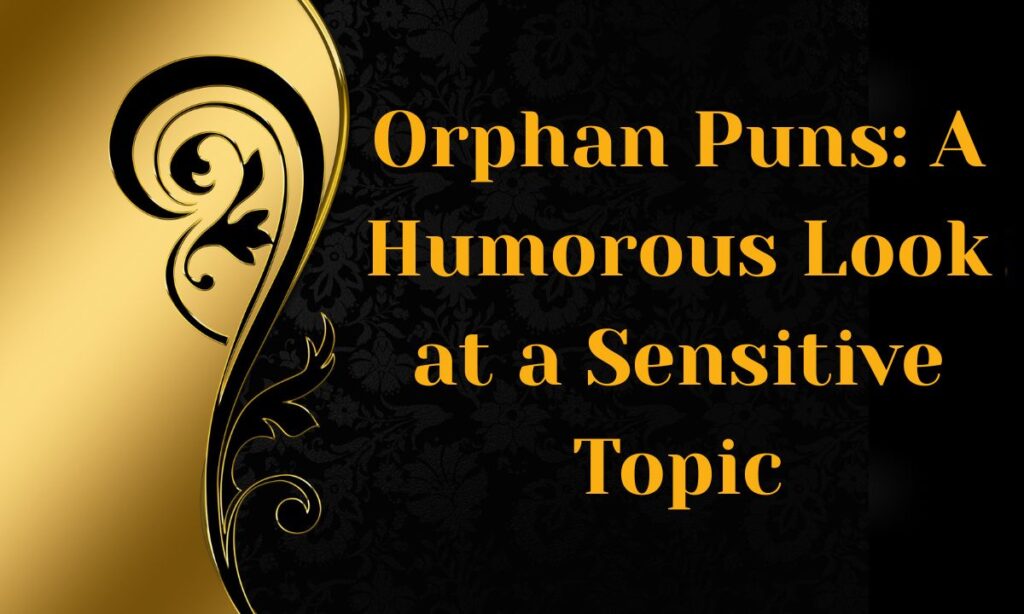delicate tightrope between humor and heartache, delivering wordplay that will have you chuckling one second and feeling guilty the next. This unique collection explores the surprisingly rich territory of parentless jokes from clever quips about family absence to witty wordplay about rootless existence offering a glimpse into how humor helps us process uncomfortable topics.
Whether you’re a fan of dark comedy, appreciate linguistic cleverness, or simply enjoy jokes that make you question your laughter, these orphan puns showcase how comedy can transform difficult realities into moments of unexpected connection, reminding us that sometimes the best response to life’s challenges is finding something to smile about.
Best Orphan Puns So Bad They’ll Make You Laugh Then Cry
We all need a good laugh sometimes, even when the subject seems off-limits. These orphan puns might make you feel a twinge of guilt for laughing, but that’s part of their charm. Each joke plays with the concept of family absence in surprisingly clever ways.
- I tried to write an autobiography about an orphan, but I had to leave out the beginning.
- What’s an orphan’s favorite type of music? Soul.
- The orphan opened a restaurant and called it “No Home Cooking.”
- My friend is an orphan and a magician. His specialty trick? Making parents disappear.
- An orphan’s favorite game? Solitaire.
- Why did the orphan refuse to play hide-and-seek? Nobody was looking for him anyway.
- An orphan walks into a library and asks for books about his family tree. The librarian replies, “Those would be in the fiction section.”
- What did the orphan say when he saw a family of ducks? “Lucky ducks!”
- I saw an orphan trying to build a house of cards. I told him, “Everyone has trouble building a stable family.”
- Why was the orphan a terrible gardener? He had no one to help him plant his roots.
- An orphan applied for a job at a genealogy company. They told him, “Sorry, your background check is coming up blank.”
- I asked an orphan if he had a favorite holiday. He said, “Any one that comes with a family-sized meal.”
- The orphan became a detective because he was good at finding missing pieces, especially his own.
- Why did the orphan refuse to play poker? He never had a full house.
- An orphan’s favorite place? Anywhere that feels like home.
READ THIS BLOG : 33 Easiest Art Ideas for Beginners in 2025
Orphan Puns: A Humorous Look at a Sensitive Topic
Humor often serves as our way of addressing difficult subjects. When it comes to orphan humor, the jokes work because they highlight the absurdity of tough situations. These puns aren’t about mocking real orphans but rather playing with language in unexpected ways.

- The orphan tried to write a memoir, but struggled with the opening chapter.
- An orphan walked into a hardware store asking for a family tool kit. The clerk said, “We’ve got single tools, but you’ll have to build your own set.”
- Why did the orphan become a chef? He was great at whipping up meals from scratch.
- The orphan started a landscaping business specializing in “rootless plants.”
- What’s an orphan’s least favorite board game? “Guess Who.”
- The orphan tried to join a genealogy club but found his family tree was more of a sapling.
- An orphan became a travel blogger, his specialty was “finding his place.”
- Why did the orphan become a stand-up comedian? He figured he had nothing to lose.
- The orphan opened a detective agency specializing in “missing persons” cases… particularly his own.
- What did the orphan name his boat? “The Lone Star.”
- An orphan became a tailor, specializing in “unattached sleeves.”
- Why did the orphan refuse to go to the family reunion? He didn’t want to be the odd one out.
- The orphan started a dating app with the tagline “Looking for any connection at all.”
- An orphan decided to become a minimalist; he already had a head start.
- The orphan’s favorite type of story? Anything with a found family trope.
Adopting Orphan Puns: Finding the Laughter
Sometimes the best way to deal with serious topics is through laughter. These jokes about adoption humor can help normalize conversations about different family structures. They celebrate the joy of finding new connections while acknowledging life’s complexities.
- An orphan tried to join a book club, but they said he didn’t have enough chapters in his life.
- Why did the orphan become a meteorologist? He was good at predicting when storm clouds would appear in his life.
- The orphan started a delivery service, but had trouble finding his route.
- An orphan applied to be a librarian, saying he was great at keeping things classified.
- What did the orphan say when he won the lottery? “I guess I’m finally going to have a family fortune.”
- The orphan became a motivational speaker, but his speeches lacked a family connection.
- Why did the orphan refuse to play cards? He felt like he was always dealt a bad hand.
- The orphan started a band known for their solo performances.
- An orphan opened a bakery specializing in “single” serving treats.
- What’s an orphan’s favorite flower? “Forget-me-nots,” which he always does.
- The orphan tried to join a family history class; he said he was great at starting from scratch.
- Why did the orphan become a photographer? He was excellent at capturing single moments in time.
- The orphan’s favorite place to shop? The clearance section, where everything is already discounted.
- An orphan’s favorite math problem? Long division.
- The orphan tried to write a family saga, but it ended up being a short story.
Orphan Jokes: Navigating the Line Between Funny and Heartfelt
Good comedy challenges us while making us laugh. Orphan jokes walk this delicate line, finding humor without being cruel. The best puns manage to be both clever and thoughtful, acknowledging the emotional reality behind the jokes.
- An orphan’s favorite type of art? Abstract—it reflects his sense of identity search.
- Why did the orphan become an architect? He was great at designing foundations.
- The orphan’s favorite game was “Go Fish,” but he always came up empty-handed.
- An orphan opened a gym called “Inner Strength,” because that’s all he had to rely on.
- What’s an orphan’s favorite sport? Bowling he always gets a spare chance.
- The orphan became a pilot because he was always searching for a place to land.
- Why did the orphan refuse to play musical chairs? He was used to ending up without a seat.
- An orphan started a bakery specializing in sourdough, the only thing that rose for him.
- What did the orphan call his autobiography? “Chapter Two and Beyond.”
- The orphan became a detective specializing in cases that were “parent-ly” impossible.
- Why did the orphan become a mime? He was used to not having a voice.
- The orphan started a landscaping business called “Branching Out,” ironically.
- An orphan’s favorite movie genre? Found family, for obvious reasons.
- Why did the orphan get a job at the library? He was looking for his own chapter.
- The orphan walked into a therapist’s office and said, “I have abandonment issues.” The therapist replied, “Next!”
The Psychology Behind Orphan Humor: Why We Laugh
Our brains use humor as a powerful coping mechanism. When we laugh at difficult topics, we’re processing emotions that might otherwise be overwhelming. Orphan jokes work because they transform painful realities into something we can manage through laughter.

- Laughter helps release tension about subjects that make us uncomfortable.
- We use humor to create emotional distance from painful topics.
- The unexpected connections in orphan puns surprise our brains into laughing.
- Comedy provides a safe way to acknowledge difficult truths about family structure.
- When we laugh together about sensitive topics, we create community.
- Humor serves as a bridge between painful realities and emotional healing.
- People with personal experience of hardship often develop the most sophisticated humor.
- The contrast between tragedy and comedy creates a unique emotional response.
- Our brains experience relief when tension dissolves through unexpected humor.
- Laughter triggers endorphins that help counteract negative emotions.
- Dark humor often indicates psychological resilience in the face of hardship.
- We laugh as a biological signal that perceived threats hold no immediate danger.
- Studies show humor helps people integrate difficult experiences into their life stories.
- The cognitive shift required to understand puns provides intellectual satisfaction.
- Research indicates humor helps maintain psychological distance from trauma.
Orphan Puns and Wordplay: A Linguistic Exploration
At their core, orphan puns rely on clever wordplay. They connect seemingly unrelated ideas through linguistic tricks, creating unexpected associations that surprise our brains into laughter. This form of humor requires sophisticated language processing.
- The best orphan puns use double meanings to create surprising connections.
- Wordplay transforms serious topics into playful communication.
- Our brains experience satisfaction when solving the linguistic puzzle in a good pun.
- Many orphan jokes rely on metaphors about rootless existence.
- The surprise element in puns activates pleasure centers in our brains.
- Successful wordplay depends on shared cultural understanding among listeners.
- Puns serve as linguistic bridges between emotional reality and social conversation.
- Most orphan jokes play with expectations through creative word associations.
- The satisfaction of “getting” a pun creates positive associations with difficult topics.
- Language allows complex emotional themes to become accessible through humor.
- Many orphan puns use homonyms or words with multiple interpretations.
- Wordplay functions as a social tool that builds connections through shared knowledge.
- The best puns contain multiple layers of meaning for audiences to discover.
- Different cultures have unique traditions of wordplay around family structures.
- Linguistic humor often emerges at the boundaries of language rules.
Orphan Jokes in Popular Culture: From Literature to Film
Orphan characters appear throughout literature and film, from Oliver Twist to Harry Potter. Their stories resonate because they represent universal themes of searching for connection and forging one’s own path despite a parental void.
- Charles Dickens featured numerous orphan protagonists in his influential novels.
- Many classic fairy tales center on orphaned children facing various challenges.
- Harry Potter represents one of the most famous orphans in modern literature.
- The orphan narrative creates natural opportunities for character growth.
- Batman’s orphan origin story drives his quest for justice.
- Annie stands as perhaps the most recognized orphan character in American musical theater.
- Superhero stories commonly feature orphaned protagonists seeking their purpose.
- The orphan journey is a fundamental storytelling pattern across cultures.
- Filmmakers often use orphan characters to create instant audience sympathy.
- Many coming-of-age stories begin with the protagonist losing parental guidance.
- Orphan characters frequently demonstrate unusual resourcefulness and independence.
- Writers use orphan backgrounds to explore themes of self-discovery and belonging.
- Comedians reference orphan themes when discussing resilience and identity.
- The contrast between orphan hardship and eventual triumph creates compelling narratives.
- Orphan stories shape public understanding of adoption and alternative family structures.
Crafting Clever Orphan Puns: Tips and Tricks
Want to try your hand at orphan puns? The key is finding the right balance. Good orphan jokes focus on wordplay rather than mockery, celebrating resilience rather than misfortune. Here’s how to craft jokes that make people laugh without crossing the line.

- Focus on clever wordplay rather than actual circumstances.
- Start with common phrases that allow dual interpretations.
- Incorporate themes of resilience and unexpected strength.
- Avoid jokes that rely solely on stereotypes or misconceptions.
- Connect seemingly unrelated concepts through clever language.
- Test your jokes with diverse audiences to identify problems.
- Research the subject to ensure jokes reflect reality accurately.
- Consider multiple interpretations of your material.
- Focus on delivery and timing for sensitive topics.
- Transform challenging topics into moments of connection.
- Use puns to illuminate truth rather than obscure it.
- Create space for both laughter and thoughtful reflection.
- Ask whether your joke celebrates resilience or mocks vulnerability.
- Consider whether the joke punches up rather than down.
- Balance linguistic cleverness with emotional sensitivity.
READ THIS BLOG : What is Hazevecad04 Version on PC? A Complete Guide
Ethical Considerations When Using Orphan Jokes: A Guide
Not all humor is created equal. When joking about sensitive topics like orphan status, we should consider the impact of our words. The best jokes come from a place of understanding rather than mockery, creating connection rather than division.
- Consider the potential impact on people with lived experience.
- Context matters significantly when determining joke appropriateness.
- Avoid reinforcing harmful stereotypes about orphans or adoption.
- Question whether your humor comes from understanding or ignorance.
- The intention behind the joke influences how audiences receive it.
- Ethical humor avoids causing harm to vulnerable individuals.
- Learn about the realities of orphan experiences before joking.
- Self-awareness about privilege helps avoid exploitative humor.
- Welcome those with personal experience into the laughter.
- Recognize that humor from within communities differs from outside perspectives.
- Avoid perpetuating misconceptions about orphans or the adoption process.
- Recognize the humanity and dignity of the people involved.
- Reflect on whether jokes could cause pain to affected individuals.
- Consider the power dynamic between joke-teller and subject.
- Create humor that builds connection rather than division.
Frequently Asked Question
Are orphan jokes considered offensive?
It depends on context and delivery. Jokes that mock actual orphans are offensive, but clever wordplay that acknowledges the reality while finding genuine humor can be appreciated.
Who typically enjoys orphan humor?
People who appreciate dark humor, wordplay enthusiasts, and sometimes those with personal connections to adoption or foster care who use humor as a coping mechanism.
Can orphan jokes be therapeutic?
For some, yes. Humor can help process difficult emotions by transforming painful realities into something manageable through laughter.
Should I tell orphan jokes in public?
Consider your audience carefully. These jokes work best in contexts where people understand the intention behind the humor.
Is it okay to laugh at orphan puns?
Laughter at clever wordplay is natural. The key is distinguishing between laughing at the linguistic trick versus laughing at actual orphans’ circumstances.
Conclusion
Orphan puns occupy a unique space in comedy—they make us laugh while also making us think. The best of these jokes highlight the resilience of the human spirit, using clever wordplay to transform difficult realities into moments of connection. They remind us that humor can be found even in challenging circumstances.
When done well, orphan jokes don’t mock those without parents but rather celebrate the ingenuity of language and our ability to find light in darkness. They acknowledge the complexity of family structures while finding genuine humor in unexpected places.

jack is an experienced blogger and a passionate wordsmith at Phrase Pioneers. With a keen eye for language and a deep love for writing, she shares insightful posts on grammar, phrases, and the art of communication.















